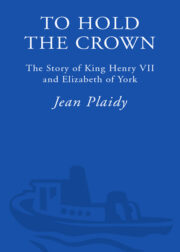“Some one hundred thousand crowns, my lord,” said Dudley with satisfaction.
“A goodly sum,” mused the King, his eyes gleaming with satisfaction. His fingers moved as though to grasp those articles that he might add their value to his exchequer.
“The goods could be said to belong to you, Sire,” said Empson. “They are after all the Princess’s dowry.”
“But what were the rules laid down by the Sovereigns?”
“That the goods should remain in the possession of the Infanta until the second half of the dowry was paid.”
“That will be in a year’s time.”
“True my lord, but we could make good use of those goods now. However, perhaps some advice could be sought.”
“De Ayala?” said the King and shook his head. “De Puebla possibly.”
“We should get more satisfaction from him. I fancy he has a wish to please us for he does not stand so high in the Sovereigns’ favor as does de Ayala for instance.”
“No, they like not his origins but to my mind he is an abler man than de Ayala. I will sound de Puebla.”
“It is the best solution, my lord.”
Henry lost no time in seeking out de Puebla. He did not summon him for he did not wish him to think that the matter of the dowry was a weighty one. However during the course of the conversation between them he said suddenly: “I should like to have possession of the dowry.”
De Puebla folding his hands together, looked down at them gravely.
“The ruling was that it should remain the property of the Princess of Wales for one year after the celebration of the nuptials.”
“I know. I know . . . but in view of the fact that it is her dowry . . . which comes to me . . . to the Prince, why should we wait this year?”
De Puebla looked sly. “My lord King,” he said, “you know full well that I have always sought to be your friend, and that has not always been easy.”
The King nodded.
“This matter of the dowry now . . . Am I correct in thinking you would prefer one hundred thousand crowns to the jewels and the furniture?”
“You are right.”
“It is no use trying to get the Sovereigns to pass the goods to you. They will never do that. But what if the Princess were to wear the jewels . . . use the furniture . . .”
“Why should she? She has plenty of those.”
“If she had her own Court she would need these things and the jewels are part of her state regalia.”
“What do you suggest, my friend?”
De Puebla was thoughtful. He guessed that the marriage had not been consummated. The Sovereigns would be angry if they knew this. They were as anxious as Henry was to get an heir from the union. De Puebla knew that much as Henry wanted an heir he was terrified that sexual exertion would rob Arthur of what little strength he had. De Puebla was mischievous by nature. He liked to be the innocent party who stirred up the waters in the pond and made them troubled and then run away and disclaim all knowledge of what he had done. That was how he had always worked. De Ayala despised him; well, he despised de Ayala, that cultured gallant diplomat. His methods were no way to make history.
The royal pair had not consummated the marriage because Henry did not want it consummated yet and the only reason was that he was afraid for his son’s health. Let the boy take his chance, thought de Puebla, and if making love was too much for him then there would be further interesting situations to amuse de Puebla. Get the pair away from the anxious parental eye . . . and then they would see.
“Since you do me the honor of asking my opinion,” said de Puebla, “I will give it. This is between ourselves, Highness. Send the Prince and Princess away to a Court of their own . . . Wales, say. The people love the Prince there. They will love the Princess too. Let them hold Court, let the Princess wear the jewels . . . use the articles of the dowry . . . then when the time comes to hand them over you will say you cannot accept second-hand goods. The furniture will have suffered, the arras . . . the tapestries will be a little worse for wear. You can then demand one hundred thousand crowns, the first half of the dowry.”
“H’m,” said the King. “You are a devious thinker, my lord.”
“In the service of Your Highness.”
“And of your Sovereigns?”
De Puebla moved an imperceptible step nearer to the King. “My lord, I have had good friendship from you,” he said. “Better than . . .”
He did not finish and the King did not ask him to.
“I will think about this matter,” said the King.
A few days later it was announced that the Prince and Princess of Wales would reside for a while in Ludlow.
They were approaching the castle—Katharine with those who were left to her of the Spanish retinue she had brought with her, headed by Doña Elvira, and Arthur with a group of advisers who had been chosen by the King.


"To Hold the Crown: The Story of King Henry VII and Elizabeth of York" отзывы
Отзывы читателей о книге "To Hold the Crown: The Story of King Henry VII and Elizabeth of York". Читайте комментарии и мнения людей о произведении.
Понравилась книга? Поделитесь впечатлениями - оставьте Ваш отзыв и расскажите о книге "To Hold the Crown: The Story of King Henry VII and Elizabeth of York" друзьям в соцсетях.